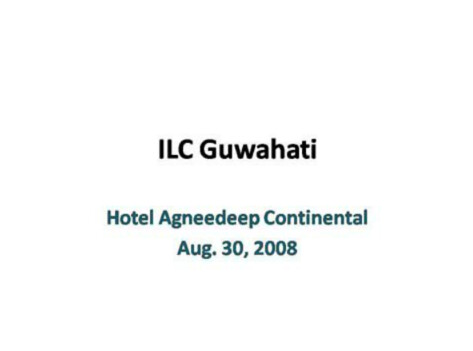The Universal Peace Federation (UPF) of India organized an International Leadership Conference (ILC) under the theme, “A New Paradigm of Leadership and Good Governance” at Guwahati, Assam, on August 30, 2008.
The ILC was honored to have among the keynote speakers the distinguished scholar, author, journalist, social activist, filmmaker and development expert Sanjoy Hazarika; the Economic Advisor to the Assam Chief Minister, Dr. Jayantha Madhab; and the Honorable Member of Parliament, Mr. Silvius Condpan; as well as a number of distinguished participants drawn from different fields including academia, politics, business and the media.
Two special Ambassador for Peace awards were presented to Mr. Sanjoy Hazarika and former Inspector General of the Police and Member of Parliament Mr. Ataur Rahman in the Opening Session. Later on, UPF also honored three other distinguished persons from the fields of the arts and media with this prestigious award.
Dr. Hazarika and Dr. Madhab analyzed the scale and urgency of developmental challenges faced by the North-Eastern States, and Assam in particular. These challenges called for good governance as well as massive injection of resources and investment, community ownership of projects, the empowerment of civil society (of women in particular), and a meaningful partnership between government and the vibrant voluntary service sector. It was important that once a project had been tested successfully, it should be expanded and multiplied on a large scale so as to have the greatest possible impact on poverty and deprivation.
Government’s role should be to ensure transparency, accountability and time-bound implementation especially for high value projects, to facilitate implementation by the voluntary sector whenever feasible and especially when it was rendered necessary because of the government’s own constraints, and to search for and support innovative approaches if conventional solutions could not be applied due to existing local circumstances.
In this connection, the conference applauded Dr. Hazarika’s successful project to extend medical services via ships and boats to increasing numbers of the 3,000,000 inhabitants of the 20,000 islands on the Brahmaputra, who were otherwise traditionally denied the fruits of governance. The Conference further appreciated the other projects being undertaken through the leadership of participants at the conference, which were discussed by Father Joseph in Tripura and Mr. Tajul Islam Bakshi (with support from the UPF) in Assam.
The conference agreed that development goals could be achieved in an accelerated manner through use of appropriate technologies, local competitive advantages combined with globalization opportunities (“glocalization”), consultation with people in the framing of economic plans, involvement of the private sector to supplement official funding, and sensitive governance, especially in handling issues like terrorism which could not be resolved solely through the use of state force. The role of the media was also highlighted in creating a positive environment for constructive initiatives.
Mr. Silvius Condpan emphasized the importance of rejecting violence as an option in resolving differences and disputes. He emphasized the role of every individual Ambassador for Peace in creating a peaceful environment in keeping with the directives and message of Rev. Father Moon. Participants commended and congratulated the UPF on organizing the ILC, which was a thoughtful, relevant, urgent and useful initiative for in the cause of peace. They highlighted the importance of creating institutions of governance and awareness within civil society in order to implement clean and efficient governance, and emphasized the need for every individual to care for those less privileged.
The conference also agreed on the urgent need to revise and expand educational syllabi in order to promote character education as a means for inculcating the values of love, responsibility, and respect for diversity, and fomenting peaceful strategies for resolving differences among the youth. It strongly endorsed the UPF emphasis on “the family as a school of love and peace,” and the core principles of living for the sake of others and recognizing the world as one family — principles completely compatible with India’s own traditional ethos of “Vasudaiva Kutumbakam.”
It urged the media to fulfill its potentially critical role in peace-building and deeply appreciated the basis of peace and good governance as defined by the UPF. Finally, the conference discussions recognized and welcomed the UPF initiatives to contribute to the creation of empowered, responsible citizens working in partnership with government in order to ensure sustainable peace and prosperity for all.
A state in northeastern India, Assam shares international borders with Bhutan and Bangladesh. It has much in common with the cultures, peoples, and climate of Southeast Asia. It is known for its tea, petroleum resources, silk, and rich biodiversity. Its high rainfall endows it with lush greenery, and the mighty river Brahmaputra, its tributaries, and oxbow lakes give the region a unique aesthetic environment.

